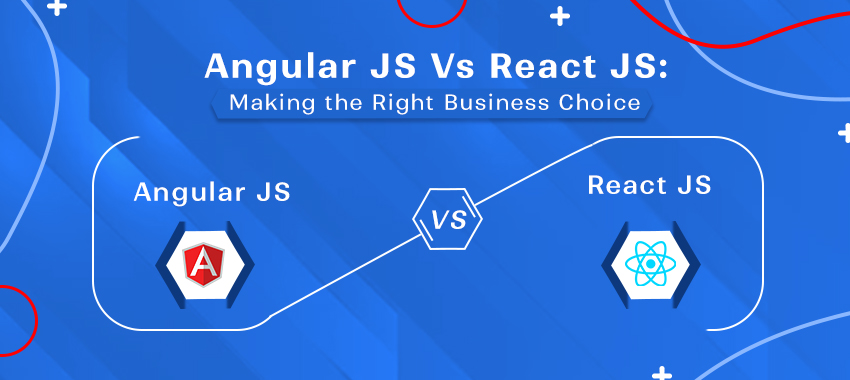
Choosing the Right Framework for Your Business
Choosing the proper framework for your web development can be confusing. The decision becomes even more difficult when it comes to business-oriented applications, where factors like performance, scalability, and developer productivity directly impact the bottom line. Today, there are numerous super resourceful options available that can facilitate project requirements. Among them, Angular JS and React JS stand out as two of the most popular choices for building modern, dynamic web applications. In this blog, we will dive deep into the comparison of Angular JS and React JS, helping you make an informed choice for your business's web development needs.
What Is Angular JS
Angular JS, an open-source framework by Google, focuses on dynamic web view modifications. It's designed for elements like tables, charts, menus, forms, buttons, and multimedia. By using HTML attribute directives, Angular JS makes it easy to create customer-aligned websites. Plus, it ensures maintainable code and faster turnarounds, reducing security risks.
This framework is mainly used for single-page apps and complex web applications.
Key Features Of Angular JS
-
Comprehensive Framework: Angular JS offers powerful tools like data binding, dependency injection, form handling, and routing.
-
TypeScript Integration: Typescript helps catch errors during development, improving code quality.
-
Angular CLI: The Angular Command Line Interface simplifies project setup and building.
-
Two-Way Data Binding: Angular JS syncs model and view data seamlessly.
-
Built-in Libraries: Angular JS offers integrated libraries for cohesive development.
Benefits Of Using Angular JS
With its user-friendly approach and powerful features, Angular JS presents several advantages that make it a preferred choice for web development. Let's explore the key benefits that Angular JS brings to the table:
-
Organized Structure and Intuitive Architecture: AngularJS employs strong organization principles and provides an intuitive application structure, promoting cleaner and more structured code development.
-
Effortless Maintenance and Testing: AngularJS streamlines building, maintaining, testing, and updating processes, ensuring a smoother development lifecycle.
-
Integrated Features: AngularJS comes with integrated tools like RxJS for reactive programming and AngularCLI for efficient project management, enhancing developer productivity.
-
Built-in Support for HTTP, AJAX, and Observables: AngularJS simplifies communication with servers by offering built-in support for HTTP requests, AJAX operations, and Observables, improving data handling and application responsiveness.
-
Parallel Component Execution and Reduced Code Length: Angular JS allows parallel component execution, resulting in fewer lines of code required for development. This efficiency accelerates both product and application performance.
-
Swift Server-Side Rendering: AngularJS enables rapid server-side rendering, ensuring a quick display of content and a seamless user experience, especially for dynamic content.
-
Enhanced Developer Productivity and Performance Optimization: With its comprehensive toolkit, AngularJS enhances developer productivity. Its performance optimization techniques contribute to creating faster and smoother applications that meet modern user expectations.
What is React JS
React JS is an open-source JavaScript library developed by Facebook engineers used for building user interfaces (UIs) and single-page applications (SPAs). Instead of dealing with complex templates or models, React JS focuses on components. This approach lets you easily create custom components for your applications.
The library emphasizes speed, simplicity, and scalability. It achieves this by managing tasks through virtual DOMs, which give developers more control over how data flows across different platforms and flexibility as needed depending on what application they’re working on at any given time.
Key Feature of React JS
-
Declarative Views: Easily define UI appearance based on data state.
-
Efficient Virtual DOM: Optimizes rendering for improved performance.
-
One-way data Binding: React enforces one-way data binding, simplifying the data flow within your application and reducing potential errors.
-
Component Reusability: Easily reuse and compose UI elements
-
Flexible Building Blocks: React offers the flexibility to create building blocks for your UI components, allowing for modular design and easy reusability.
-
Rich Ecosystem: Abundance of third-party tools and community support.
Benefits Of Using React JS
1. Optimal Performance with Virtual DOM: React JS utilizes a Virtual DOM for enhanced performance, ensuring efficient updates to the user interface.
2. Efficient Code Reuse Through Components: React’s component-based structure enables efficient code reuse, leading to streamlined development.
3. Open Source and No Licensing Fees: React JS is open-source, eliminating licensing costs and increasing accessibility for developers.
4. Strong Data Binding Support: React offers robust data binding capabilities, making data manipulation and synchronization easier.
5. Developer-Friendly Tools: React provides excellent developer tools that facilitate debugging and code optimization.
6. Robust Community & Third-Party Libraries: React has a thriving community that contributes to a rich library of third-party components, accelerating development and project completion.
7. Maintaining High-Quality Apps Based on Test-Driven Development: React JS supports test-driven development, ensuring the creation of robust applications.
AngularJS vs. ReactJS: A quick comparison
To choose the right framework for your business, several key criteria must be considered:
1. Learning Curve: Angular's comprehensive nature can lead to a steeper learning curve, especially for developers new to web development. React's simpler concepts make it easier for developers to pick up and start building.
2. Flexibility: React's focus on UI components gives developers more flexibility in integrating it with existing projects or other libraries. Angular's opinionated structure can be beneficial for maintaining consistency but might limit flexibility in certain scenarios.
3. Performance: Both frameworks aim to provide good performance, but React's virtual DOM updates often result in faster rendering compared to Angular's two-way data binding.
4. Scalability: Angular's built-in features, such as dependency injection and state management, can simplify scaling for larger applications. React's scalability relies on additional libraries and architectural decisions.
5. Community and Ecosystem: React has a larger community and a vast ecosystem of third-party libraries and tools. This can lead to quicker problem-solving and access to a wider range of resources.
6. Documentation and Support: Both Angular and React have well-maintained documentation, but Angular's comprehensive documentation might be advantageous for larger teams or complex projects.
Choosing the Right Framework for Your Business:
Choosing the right framework depends on your business requirements and the nature of your projects:
Choose Angular JS If:
-
You're building a complex application that requires a structured framework.
-
Your team is comfortable with a more opinionated setup.
-
You need built-in tools for routing, form handling, and state management.
-
Your project requires strict modularity and dependency injection.
Choose React JS If:
-
Your focus is on building engaging user interfaces.
-
You value flexibility and want the option to integrate with various libraries and tools.
-
You're working on a project with varying levels of complexity.
-
Your team prefers a simpler learning curve.
Conclusion
Angular and React each have their strengths and weaknesses, making them suitable for different business scenarios. Angular's comprehensive nature and built-in tools can be a strong fit for complex applications, while React's flexibility and focus on user interfaces make it a top choice for dynamic and engaging web experiences.
Ultimately, choosing the right framework for your business depends on a careful assessment of your project's requirements, your team's skills, and the long-term goals of your development efforts. By understanding the details of both Angular and React, you'll be better equipped to make an informed decision that sets your business on a path to success in the ever-evolving world of web development.
Ready to Turn Your App Idea Into Reality? Contact Apollo Infotech Today!
If you’re ready to dive into the world of app development using Angular JS or React JS, or if you're feeling unsure about which framework to choose, we're here to help. At Apollo Infotech, we specialize in creating exceptional apps that cater to your unique needs.
Don't let confusion hold you back. Our experienced team can guide you through the decision-making process, ensuring that you make the right choice for your project. With our expertise, your app will be on the path to success in no time.
Get in touch with us today and let’s bring your app idea to life with skill and precision. Your app’s success story starts here!



